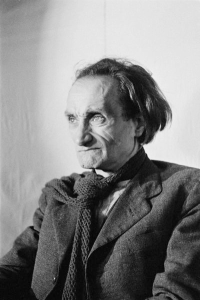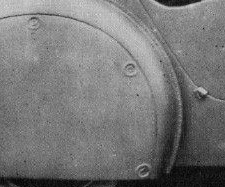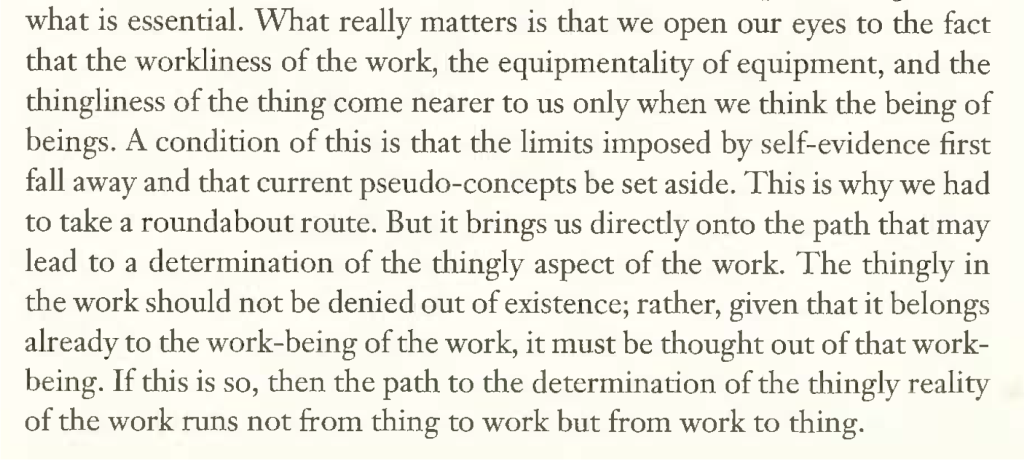Prac Crit
Nervometer
by Ahren Warner
Deep Note
by Ahren Warner
i. [Bugatti Aerolithe, 1935]

ii. [Denise Colomb, Antonin Artaud, 1947]
iii.
…there is a point, phosphorescent, where reality
finds itself, though changed, metamorphosed – by what?
A point where the use of things, objects, is magic.
I believe in kamacites of the cerebellum, personal
cosmologies, dear friends. That which you have taken
for my work was excrement, scuzzballs of the soul,
which your average man would not welcome.
My illness, since then, has receded, advanced;
the question is not there, but in the sorrow,
death that persists in my skull… To return to M…
Where I recovered numbness, vertigo, this gruff need,
mad slumber, sudden loss, impotence, vast
sorrow, instantaneous numbing of mind.
iv.
Et voilà, moi, ce que je pense de la pensée:
CERTAINEMENT L’INSPIRATION EXISTE.
Et il y a un point phosphoreux où toute la réalité se retrouve, mais changée, métamorphosée, – et par quoi ? ? – un point de magique utilisation des choses. Et je crois aux aérolithes mentaux, à des cosmogonies individuelles.
[Antonin Artaud, Le pèse-nerfs, 1925]
***DETOUR***
v.
By crystallizing in itself as something unique to itself, rather than complying with existing social norms and qualifying as ‘socially useful,’ it criticizes society by merely existing, for which puritans of all stripes condemn it. There is nothing pure, nothing structured strictly according to its own immanent law, that does not implicitly criticize the debasement of a situation evolving in the direction of a total exchange society in which everything is heteronomously defined. Art’s asociality is the determinate negation of a determinate society.
[Theodor W. Adorno, Aesthetic Theory]
…a cognition that is to bear fruit will throw itself to the objects à fond perdu. The vertigo which this causes is an index veri; the shock of inconclusiveness, the negative as which it cannot help appearing in the frame-covered, never-changing realm, is true for untruth only.
[Adorno, Negative Dialectics]
…wherein the negative or ‘means’ exists as ‘the external middle term of the syllogism … the realization of the end’.
[G.W.F. Hegel, Phenomenology of Mind, sort of…]
Reified consciousness is a moment in the totality of the reified world. The ontological need is the metaphysics of that consciousness even when its doctrinal content leads it to exploit the critique of reification that has nowadays become so cheap. The form of invariance as such is the projection of what has congealed in the reified consciousness.
[Adorno, Negative Dialectics]
vi. BUT:
Seaming vs. seeming
(https://www.youtube.com/watch?v=gpaOy8b8X6A)
THOUGH:
The spectacular character of modern industrial society has nothing fortuitous or superficial about it; on the contrary, this society is based on the spectacle in the most fundamental way. For the spectacle, as the perfect image of the ruling economic order, ends are nothing and development is all although the only thing into which the spectacle plans to develop is itself.
[Guy Debord, The Society of the Spectacle]
vii. Yet:

what the fuck are you looking at?
A flash?
BANG
ASIDE:
Apparently, Picasso nicknamed Brassai ‘THE TERRORIST’ because – unlike Cartier-Bresson skulking in a doorway – he had a penchant for detonating flash powder within close proximity to his subjects and, collaterally, the other patrons of the cafés he was apt to frequent.
***RETOUR***
vii. to M… and:
CERTAINEMENT L’INSPIRATION EXISTE.
POURQUOI LES MAJUSCULES?
viii. and, BTW: ‘un point de magique utilisation des choses’
– Does this take us back to Heidegger’s thingythingness
of the thingything, thing? I really hope not.
But (just in case):
blaaaah…
and
ix. A question:
are the rivets of the Aerolithe a truly thingy thing?
[Any more or less than the flash glass in the eyes of an ailing Artaud?]
[Does it matter?]
Perhaps not… but… here’s the BIGGY: what about the MAJUSCULES
CERTAINEMENT L’INSPIRATION EXISTE.
Of course, we could be like, does it?
And then I’d be like yeah, but…
BUT:
Look how the caps are the flash in a glassy eye, the rivets of the conceptual wheel-trim, are (uh-hem) line breaks…
xiv: Question B:
is x more of a determinate negation of a determinate society than y?
if x = the sexy rivets of a conceptual wheel-trim, and y = the flash glass Artaud’s affect-ridden eye?;
if x = oracular flash glass, and y = MAJUSCULES?;
if x = Original MAJUSCULES, and y = the superimposition of the line-break?
[please show your working]
Nervometer
by Ahren Warner
After Antonin Artaud
I
I have always been struck by the obduracy
of mind – by how it must always want to think
in dimensions, in space, arbitrarily – struck
by the fixation of being with beginning…
I admit of an intricately wrought soul –
brimstone, phosphoric – as the only acceptable
mode of reality. I do not know what unknown
clarity, unnameable, gifts me this scream,
this pitch, this possibility of feeling my mind…
I would like you to imagine a state, motionless:
a mass of mind, part-buried, potential. You see,
through a crystal, an actor tread inspiration.
You must not admit too much literature.
II
I’ve aimed no further than the soul’s automata,
transcribed no more than the sorrow of adjustment
aborted. I am a complete abyss. Those that believed
me capable – of a sorrow complete, beautiful sorrow;
an angst corporeal, replete; an angst that exists
as objects, a luminous pestling – not a point
suspended (yet, restless, deracinating needs come
via tussle of force and void, absolute end
and there is no more than these voluminous
voids, the immobile, cold), those who have given
more life to me – have thought me less fallen,
believed me plunged into torture, noise, darkness
and struggling – are lost in the shadows of men.
III
Sleep: nerves tense the legs’ whole length,
myoclonic belief. The pressure eased, absurd…
We must understand, intelligence is no more
than a vast eventuality. And that it can be
lost – not like the dead, estranged, mad –
like the living, feeling its attraction, its breath
(intelligence, not life). The thrill of intelligence,
the sudden inverse of opposites, the words
nearly near intelligence. This possibility
of thinking in inverse, of sudden repulsion,
of turning invective on thought. This dialogue
in thought, the absorption, the rupture.
The trim fall. The mind, idling…
IV
To think without the least rupture, the pitfalls,
those sudden vanishings I’m so used to, which
my marrow is used to: cathodes. My marrow
flirts, sometimes, with these furtive abductions,
amused. One word would suffice, sometimes –
a simple, small word – to rise, to reach
prophetic inflection. A word – precise, subtle –
a witness soused in my marrow, a word
which would leave me, stand at my bounds:
nothing for the world. I am the witness,
my only witness. This crust of words, low voiced,
imperceptible mutation of thought: preformed,
miscarried. I am the only judge of its import.
V
Under my crust of bone and skin (skull),
there is angst, constant; not moral, not the absolute
end of deduction, of dim finickiness, or
the inhabiting of angst rising to its height, its meaning,
but a decanting at my core, the self-deprivation
of substance, vital, the physical loss, essential
– I mean the essential loss – of meaning…
…The difficulty is of finding its proper place,
of rediscovering communication with ‘self’.
All this is flux, specific, of things; the reassembling
of mental cement, stone, gem; the rendering
around a point. There you go, ego, what I think
of thought: inspiration exists…
VI
…there is a point, phosphorescent, where reality
finds itself, though changed, metamorphosed – by what?
A point where the use of things, objects, is magic.
I believe in kamacites of the cerebellum, personal
cosmologies, dear friends. That which you have taken
for my work was excrement, scuzzballs of the soul,
which your average man would not welcome.
My illness, since then, has receded, advanced;
the question is not there, but in the sorrow, death
that persists in my skull… To return to M…
Where I recovered numbness, vertigo, this gruff
need, mad slumber, sudden loss, impotence, vast
sorrow, instantaneous numbing of mind.
VII
Life is a point. The soul is without sections, segments,
without stratification. The mind does not begin… I am
a numbnut – suppression of thought, malformation –
made vacant by language, stupefied. Malformation,
mal-agglomeration of a critical mass of glassy, glazed
cells; cells you use blithely, unknown, inattentive.
These terms I choose for thought are, for me, terms –
a precise term – true terminations of mind, ends
of states submitted to thought. I am localised, truly,
by my terms: cerebral invalids. I am paralysed
by these terms, a suite of terminations. I can think
only in terms – oxymoronic, parallel, equivocal –
under pain of stopping, halted at a moment in thought.
VIII
If one could only taste the abyss, the nothingness,
could lie down in it; if this nothingness was not
a certain living; if it was not, not completely, death.
It is so hard to be, to not be within… True
sorrow is feeling the self and, within it, this
displacement of thought, though, at a point,
thought is not suffering. I am at a point
where I can no longer touch life, though
I have all the appetites, the insistent arousals
of being… In each one of these movements
there are holes, haltings. Not in time, understand me.
In a particular kind of space, I understand me.
I mean neither extent, nor duration.
IX
I mean a thought, one, a single thought
interior. Not a thought such as Pascal’s, not a thought
philosophic. A thought obsessed, skirting: a certain
sclerosis. I consider myself in all my minutiae.
I have my finger on the flaw, fissure, tectonic fault;
its secret slippage. For, the mind is more reptilian
than you, sirs, it strips itself, sheds, wrongs itself
as language, suspended. I have felt best this splayed,
stupefied language, the disarray of uttered thought.
I have pinpointed best the intimacies, its subtle
slippage. I lose myself in thought as a dream,
true. I realise my submission in thought.
I know best the nooks, these crannies of loss.
X
All writing is dishonest. Folks that shun the nebulous,
that aim to detail the events of thought, are bastards.
All men of letters are bastards, contemporary bastards
are the worst. All those who would map the mind,
all those who are masters of their language, all those
for whom words have a meaning, for whom heights
exist in the soul, currents in thought, those minds
of their times, those who have named such thoughts,
have toiled for precision, those unoiled movements,
squeaking, disgorging their minds, are bastards.
Those for whom a word has a meaning, a manner
of being, for whom feelings can be classed, classified,
discussed by degree, are the worst of all bastards.
XI
No works, not of language, of speech, of mind, nothing.
Nothing except, perhaps, a beautiful nervometer…
These states, eminent situations of the soul, these intervals
of mind; these failed letters, my quotidian pain; people,
unreal data. Always the same words that serve me, truly
there seems to be so little movement in my thought,
though more than in yours: pertinent bastards, masters
of false verbs, serial novelists, ruminants, scourge
of my language. That I no longer have language is not
a reason for you to exist, persist, insist in language.
I will be understood by a future you, a future
mediocrity. These, my salvos, will be understood;
they will have learned to understand, to discover.
XII
My hair will be cast in lime, so too my cerebral and choroid.
One will be able to view, to take in my bestiary. My faith
will have become a mitre. Smoke, from the sculpting
of stone; bouquets, arboreal, crystals among lexicons;
one will see kamacite, falling. These chords,
geometries without space, this configuration of mind
will be learned, understood. It will be understood how
I have lost my mind. It will be understood why
my mind is not here. All languages will run dry, shrivel.
Desiccated minds, all. Man’s figurations
levelled, deflated: sucked dry by arid aroliums. This
lubricant membrane, caustic, will continue to float
through the air; melancholic, tactile, miasmatic.
XIII
Uncovered – I will no longer have the need of speech.
From Pretty (Bloodaxe, 2013). Reproduced with permission of the author.



